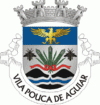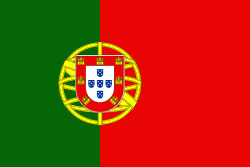Vila Pouca de Aguiar (Vila Pouca de Aguiar)
 |
 |
There are various theories on the munipality's origins. Some historians believe it was the successor to the ancient city of Cauca, governed by Emperor Theodosius I; however, it is uncertain why or when its name would have been changed from Cauca to Pouca. Another theory is that "Vila Pouca" referred to a small agrarian community, and that "Aguiar" referred to an ancient administrative region, to disambiguate it from other communities named Vila Pouca. Although the name means "Vila Pouca of Aguiar", "aguiar" is derived from aquila ("where the eagles are").
In the 13th century, the municipality was part of the land of Aguiar. In the 12 and 13th centuries, Aguiar consisted of seven ecclesiastical parishes, including São Salvador de Jugal, which corresponded to the actual parish of Vila Pouca de Aguiar. The Inquirições (inquiries/inventory) of King Afonso II established that the parochia of São Salvador de Jugal was composed of these localities and towns: Condado (three couples); Calvos (one couple); Guilhado (four couples) and Nuzedo (20 couples), in addition to the towns of Fraengo and Outeiro. The document also identifies Jugal as an administrative unit, with elaborated administrative domain over the territory of Aguiar, and where the parochial church was located, but no reference to Jugal as a town.
There is no historical explanation for the name-change from São Salvador de Jugal to Vila Pouca, nor when it occurred, although it was sometime in the 14th century.
In the early 20th century, the area's leading figure was Martiniano José Ferreira Botelho, a doctor, druggist, and politician known for his humanitarian character and his advocacy of the local medicinal waters for treatments. He and his family donated land to the community for the current market square, municipal slaughterhouse and well.
Map - Vila Pouca de Aguiar (Vila Pouca de Aguiar)
Map
Country - Portugal
 |
 |
| Flag of Portugal | |
One of the oldest countries in Europe, its territory has been continuously settled, invaded and fought over since prehistoric times. The territory was first inhabited by pre-Roman and Celtic peoples who had contact with Phoenicians, ancient Greeks and Carthaginians. It was later ruled by the Romans, followed by the invasions of Germanic peoples and the Islamic invasion by the Moors, whose rule was eventually expelled during the Reconquista. Founded first as a county of the Kingdom of León in 868, gained its independence as the Kingdom of Portugal with the Treaty of Zamora in 1143.
Currency / Language
| ISO | Currency | Symbol | Significant figures |
|---|---|---|---|
| EUR | Euro | € | 2 |
| ISO | Language |
|---|---|
| PT | Portuguese language |
















